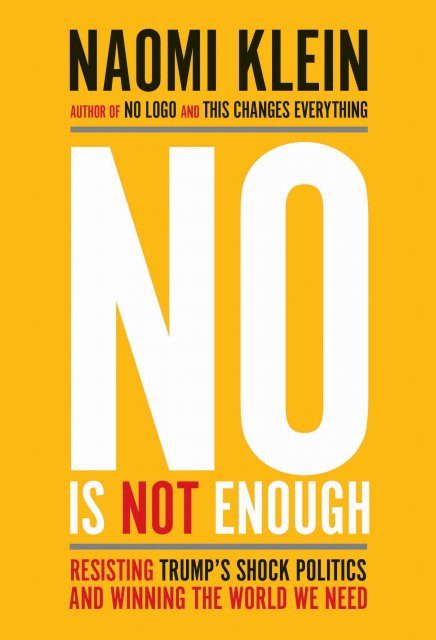
By Naomi Klein
Guardian UK (6/10/17)
Shock. It’s a word that has come up again and again since Donald Trump was elected in November 2016 – to describe the poll-defying election results, to describe the emotional state of many people watching his ascent to power, and to describe his blitzkrieg approach to policymaking. A “shock to the system” is precisely how his adviser Kellyanne Conway has repeatedly described the new era.
For almost two decades now, I’ve been studying large-scale shocks to societies: how they happen, how they are exploited by politicians and corporations, and how they are even deliberately deepened in order to gain advantage over a disoriented population. I have also reported on the flipside of this process: how societies that come together around an understanding of a shared crisis can change the world for the better.
Watching Donald Trump’s rise, I’ve had a strange feeling. It’s not just that he’s applying shock politics to the most powerful and heavily armed nation on earth; it’s more than that. In books, documentary films and investigative reporting, I have documented a range of trends: the rise of superbrands, the expanding power of private wealth over the political system, the global imposition of neoliberalism, often using racism and fear of the “other” as a potent tool, the damaging impacts of corporate free trade, and the deep hold that climate change denial has taken on the right side of the political spectrum. And as I began to research Trump, he started to seem to me like Frankenstein’s monster, sewn together out of the body parts of all of these and many other dangerous trends.
“Up until now, in US politics there’s been a mask on the corporate state’s White House proxies: the smiling actor’s face of Ronald Reagan or the faux-cowboy persona of George W Bush (with Dick Cheney/Halliburton scowling in the background). Now the mask is gone. And no one is even bothering to pretend otherwise.”
Ten years ago, I published The Shock Doctrine: The Rise of Disaster Capitalism, an investigation that spanned four decades of history, from Chile after Augusto Pinochet’s coup to Russia after the collapse of the Soviet Union, from Baghdad under the US “Shock and Awe” attack to New Orleans after Hurricane Katrina. The term “shock doctrine” describes the quite brutal tactic of systematically using the public’s disorientation following a collective shock – wars, coups, terrorist attacks, market crashes or natural disasters – to push through radical pro-corporate measures, often called “shock therapy”.
Though Trump breaks the mould in some ways, his shock tactics do follow a script, one familiar from other countries that have had rapid changes imposed under the cover of crisis. During Trump’s first week in office, when he was signing that tsunami of executive orders and people were just reeling, madly trying to keep up, I found myself thinking about the human rights advocate Halina Bortnowska’s description of Poland’s experience when the US imposed economic shock therapy on her country in the midst of communism’s collapse. She described the velocity of change her country was going through as “the difference between dog years and human years” and she observed that “you start witnessing these semi-psychotic reactions. You can no longer expect people to act in their own best interests when they’re so disoriented they don’t know – or no longer care – what those interests are.”
From the evidence so far, it’s clear that Trump and his top advisers are hoping for the sort of response Bortnowska described, that they are trying to pull off a domestic shock doctrine. The goal is all-out war on the public sphere and the public interest, whether in the form of antipollution regulations or programmes for the hungry. In their place will be unfettered power and freedom for corporations. It’s a programme so defiantly unjust and so manifestly corrupt that it can only be pulled off with the assistance of divide-and-conquer racial and sexual politics, as well as a nonstop spectacle of media distractions. And, of course, it is being backed up with a massive increase in war spending, a dramatic escalation of military conflicts on multiple fronts, from Syria to North Korea, alongside presidential musings about how “torture works”.
Trump’s cabinet tells it all
Trump’s cabinet of billionaires and multimillionaires tells us a great deal about the administration’s underlying goals. ExxonMobil for secretary of state; General Dynamics and Boeing to head the department of defence; and the Goldman Sachs guys for pretty much everything that’s left. The handful of career politicians who have been put in charge of agencies seem to have been selected either because they do not believe in the agency’s core mission, or do not think the agency should exist at all. Steve Bannon, Trump’s allegedly sidelined chief strategist, was open about this when he addressed a conservative audience in February. The goal, he said, was the “deconstruction of the administrative state” (by which he meant the government regulations and agencies tasked with protecting people and their rights). “If you look at these cabinet nominees, they were selected for a reason, and that is deconstruction.”
Much has been made of the conflict between Bannon’s Christian nationalism and the transnationalism of Trump’s more establishment aides, particularly his son-in-law, Jared Kushner. And Bannon may well get voted off this gory reality show entirely before long (or maybe, given current legal troubles, it will be Kushner). Given these palace intrigues, it’s worth underlining that when it comes to deconstructing the state, and outsourcing as much as possible to for-profit corporations, Bannon and Kushner are not in conflict but in perfect alignment.
“The fact that such defiant levels of profiteering from public office can unfold in full view is disturbing enough. As are so many of Trump’s actions in his first months in office. But history shows us that, however destabilised things are now, the shock doctrine means they could get a lot worse.”
Under the cover of this administration’s constant cloud of chaos – some deliberately generated by Trump, much of it foisted upon him by his incompetence and avarice – this shared agenda is being pursued with methodical and unblinking focus. Trump and his cabinet of former corporate executives are remaking government at a startling pace to serve the interests of their own businesses, their former businesses and their tax bracket as a whole. For instance, within hours of taking office, Trump called for a massive tax cut, which would see corporations pay just 15% (down from 35%), and pledged to slash regulations by 75%. His tax plan includes a range of other breaks and loopholes for very wealthy people like the ones inhabiting his cabinet (not to mention himself). The healthcare plan he has backed will cause approximately 23 million people to lose coverage, while handing out yet more tax breaks to the rich.
Targeting public protections
He has appointed Kushner to head up a “Swat team” stacked with corporate executives who have been tasked with finding new regulations to eliminate, new programmes to privatise and new ways to make the US government “run like a great American company”. (According to an analysis by Public Citizen, Trump met with at least 190 corporate executives in less than three months in office – before announcing that visitor logs would no longer be made public). Pushed on what the administration had accomplished of substance in its first months, budget director Mick Mulvaney cited Trump’s hail of executive orders and stressed this: “Most of these are laws and regulations getting rid of other laws. Regulations getting rid of other regulations.”
That they are. Trump and his team are set to detonate programmes that protect children from environmental toxins, they have told gas companies they no longer need to report all of the powerful greenhouse gases they are spewing, and are pushing dozens and dozens of measures along the same lines. This is, in short, a great unmaking. …
*****
Support Alernative News From In These Times: Donate $30 And Get Naomi Klein’s New Book For Free

In many ways, the election of Donald Trump feels like the culmination of the numerous recent crises we’ve faced in the United States, from climate disasters to corporate takeovers to financial meltdowns. So what better thinker to guide us through this trying moment in our history than Naomi Klein?
No Is Not Enough provides a kaleidoscopic view of the threats the Trump administration poses to our climate, economy, civil society and so many other aspects of our lives. Yet the book also points a way forward, showing how individuals and groups are successfully pushing back and advancing movements for justice even in the face of these unprecedented threats.
Noam Chomsky calls the book “urgent, timely, and necessary.” Arundhati Roy says, “Naomi Klein has written an ordinary person’s guide to hope.”
We’re partnering with the book’s publisher, Haymarket Books, and every dollar of your donation will help ensure that In These Times is able to report on the growing movements resisting the Trump administration and working to build a more just future.
It’s a mission Naomi Klein, an In These Times contributing editor, has carried out for more than a decade through her groundbreaking writing.
No Is Not Enough goes on sale next Tuesday, June 13. Please make your donation of $30 or more today to claim your copy, and we’ll send this important book to you as soon as it’s released.
In solidarity,
Joel Bleifuss
Editor & Publisher
P.S. For international orders, please make a donation of $50 or more to cover shipping expenses.
P.P.S. All donations to In These Times are tax-deductible, to the extent permitted by law.

